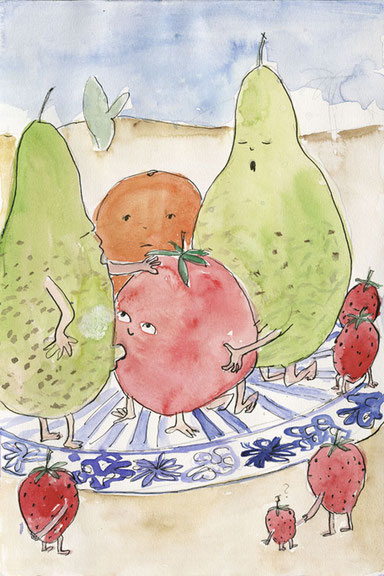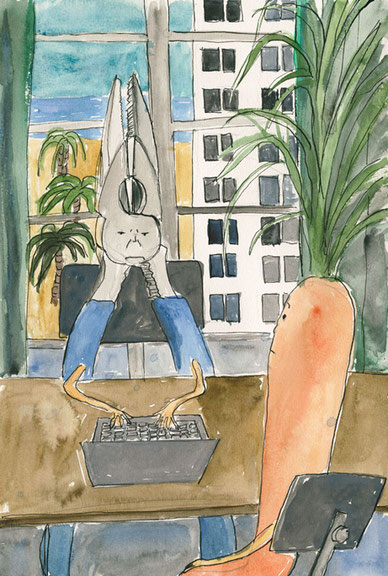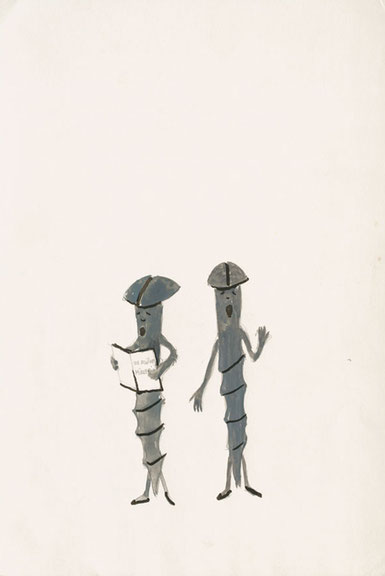Issue 4/2011 - Ware Freundschaft
The Terror of Positivity
An Interview with the Philosopher and Media Theorist Byung-Chul Ha
No one can honestly say they have an overview over the extent of the global data mountains in the internet. During the early years of the internet, cyber culture was still alive with futuristic ideas. Today, the mood on the World Wide Web is far more pragmatic and obsessed with the present. Users are driven by market share, self-marketing and other techniques of the self. The private domain, not the political one, is public. A handful of top firms like Apple, Facebook, Google and Weibo try to bond customers to their self-contained systems. What is the community feeling in a close digital world? Invisible algorithms steer personalized search results and generate advertisements. A few well-networked hackers prevail in the face of the mainstream and copyrights.
Increasingly, the internet appears to be regulated as a digital desk with attached film and TV archives, department stores, cafés and a communication terminal. Once one social network has been installed, people are reluctant to start all over again with another one. People who want to use the most recent social network, Google+, have to register under their real name; firms want consumers and not blogging activists, and least of all ephemeral avatar creatures.
The philosopher Byung-Chul Han has come up with refreshing explanation models for this change from optimistic elation to pragmatic user interests. In his 2006 book »Hyperkulturalität«1 (Hyperculturality), Han describes how culture changes under global conditions. Different times and continuities exist side-by-side in hyperculture – which is why Han calls his global terrain a »mosaic universe.« Friendliness is the basis of hyperculturality. »Its very lack of rules enables a widespread impact. It creates a maximum in solidarity with a minimum of interrelation. Where the shared horizon unravels in a multiplicity of different identities and ideas, it engenders a singular involvement, a continuum of discontinuities.«2 »Müdigkeitsgesellschaft« (Tiredness Society) 3 was published this past summer, a surprise hit that the very society it analyzes welcomed as a fitting diagnosis. While the creative game with fictive identities was described as hyperculture, »Müdigkeitsgesellschaft« is the result of the weary society’s »surplus of positivity.« That’s why there was so little energy! This positivity »inhabits the negativity-free space of the same, where there is no polarization of friend versus foe, inside versus outside, or what is personal versus what is foreign.«4 This is where his most recent book picks up: »Die Topologie der Gewalt« (The Topology of Violence)5, which is about transparency as an effect of the economic process.
In digital forums, it was netiquette that ennobled the discourse with a few commonly accepted rules; social networks, on the other hand, try to prevent negative statements of any kind by providing only narrow windows for interaction. No less than five million users are after all in favor of a »dislike« button on Facebook. Compared with the 750 million members, that is a negligible figure. Can friendliness still be relevant in such a context? And what about the non-material value of friendship?
[b]Vera Tollmann:[/b] In your 2006 book »Hyperkulturalität,« you characterized hyperculture using internet-specific terms such as links and networking. When you say hyperspace, do you mean the internet, or is hyperculture evident elsewhere as well?
[b]Byung-Chul Han:[/b] Hyperspace is a completely hybrid and promiscuous space where everything is intermingled and networked with everything else, a space where cultural and territorial markers have been deleted, a space marked by a total lack of distance. Hyperculturality is hence different from inter- and multiculturality, which is still infused with the negativity of cultural tensions, and varies as well as from transculturality, which still preserves cultural markers and spatial scope. Of course, the internet certainly has elements of hyperspace and speeds up global hyperculturization. Culture in a classic sense disappears in what is, so to speak, more cultural than culture, namely in hyperculture and in reality: as Baudrillard would put it, it disappears in what is more real than real, namely in hyper-reality.
[b]Tollmann:[/b] The sociologist Aras Özgün once compared the dominance of the social networks to Haussmann’s modernization of 19th-century Paris: the social networks, he says, are the grand boulevards of the internet. Do the social networks also make up the architecture of hyperculture, or do you see other organizational forms in the Net?
[b]Han:[/b] The term »boulevard« comes from »bolwerc,« that is bulwark, originally part of a fort fortified by ramparts and trenches. Paris boulevards actually do resemble these bulwarks. The network is no bulwark, however. A rhizome would be a more fitting metaphor for a network. On the other hand, social networks are not as open and uncontrollable as rhizomes. They form instead an electronic panopticon. The internet is not merely a space that grants freedom; it is in itself a panopticon that enables total control. It offers up all its users either to a voyeuristic gaze from the outside or to capitalist exploitation. Contrary to the panopticon in a disciplinary society, however, control is not achieved by isolation but by interconnection. Confined inmates make way for free users – or at least users who believe they are free. But both are at the mercy of the panoptic gaze.
[b]Tollmann:[/b] Which notion of freedom does the internet stand for? Is it »freedom of choice« – the neo-liberal formula?
[b]Han:[/b] Freedom is manifest as excessive dislimitation, as exposure that goes as far as pornographic nudity, as an orgy of communication, information and production. But what is interesting is that this freedom is turning into its original opposite. In »Müdigkeitsgesellschaft,« I pointed out that freedom is turning into the violence of self-exploitation. The freedom of dislimitation and disinhibition spawns obscenity. A world without narration, rituals or scenes is obscene. A world that no longer needs a scenography is pornographic.
[b]Tollmann:[/b] You write that »friendliness is capable of the kind of ›windowing‹ that opens and connects« different cultures. »Windowing« is what you call the »hypertextual mode of experience,« where everyone »mirrors the other or lets others become apparent in the self «.6 »Friendship« is a concept that is overtaxed in social networks. Would you say that what they call friendship is what you call friendliness?
[b]Han:[/b] A while ago, Burger King launched its »Whopper Sacrifice« project. If you delete ten friends on Facebook, you get a free Whopper. The friends are notified that they were sacrificed for a Whopper. A friendship on Facebook seems to be worth as much as a few grams of ground meat. Neo-liberalism has turned even individuals into micro-entrepreneurs who only enter into business deals that promise a profit. Friendship is no exception: it is likewise expected to be profitable. A friend, according to Aristotle, is a second self. Today, a friend is a product. And you can’t idealize Facebook as a friendly space; it is, after all, a space where unscrupulous bullying takes place. And from an economic point of view, Facebook is a space of exploitation.
[b]Tollmann:[/b] What product is traded among friends? Is it information or attention? And what would the profit be: the symbolic capital?
[b]Han:[/b] »Friends« would be customers and new friends would be new customers. They strengthen the narcissistic sensation of the ego. The internet is a space where above all you encounter yourself. The other person is long gone. Depression is a disease of the narcissistic self that has been set adrift from relationships, that has lost all sense of what is different. The virtual space is a hell of sameness.
[b]Tollmann:[/b] If you look at »Hyperkulturalität« today: was your vision of the future too optimistic? And should we regard »Müdigkeitsgesellschaft« – published five years later – as a sobering present-day analysis of this future?
[b]Han:[/b] The book »Hyperkulturalität« ends with a question mark, or rather, a Handke quote: »If you feel the pain of the threshold, you’re not a tourist and a transition is possible.« The book »Müdigkeitsgesellschaft« also ends with a chapter about Handke’s »Versuch über die Müdigkeit« (Essay on Tiredness). But it’s true: the appearance that underlies »Hyperkulturalität« is intentionally naive.
[b]Tollmann:[/b] Is hyperculture a prerequisite for the tiredness society? Is it what triggered what you’ve analyzed as a »surplus of positivity«?
[b]Han:[/b] Hyperculture is a culture without thresholds. Today, we really no longer feel the » pain of thresholds.« Total mobility and promiscuity even let the »transition« in an emphatic sense disappear. The present society breaks down any negativity. The threshold is a kind of negativity. When all thresholds, differentiations and borders are broken down, the result is a general proliferation and obesity of circuits, a hyperinformation, hypercommunication and hyperproduction. The »Müdigkeitsgesellschaft« takes the last sentence in »Hyperkulturalität« a step further, but with a new look.
[b]Tollmann:[/b] On Facebook, it is only possible to show you agree with something, by clicking on the »like« button, which has no negative counterpart. How does this lack of negativity and criticism affect society and how it communicates?
[b]Han:[/b] Where something totally different exists, shock or anger are not just a possibility: they become a necessity. Current society is dominated by a surplus of positivity, even in one’s own affective household. It seems negative feelings are an impediment to accelerating the process. The utmost in acceleration can be expected where the same answers to the same. Negativity slows down and prevents a chain reaction of sameness.
[b]Tollmann:[/b] »The Far East has a very ›natural relationship‹ with ›technical‹ networking.«7 What do you mean by that? Is the West’s relationship with »technical« networking estranged?
[b]Han:[/b] The Far East doesn’t have a culture of identity that people might feel is threatened by networking. There is much more networking: take, for instance, online games. It would appear that Asians feel more comfortable in the internet than Europeans. There is much less criticism concerning internet culture. Perhaps the Buddhist notion of reincarnation implies a general interconnection of living beings. The Chinese philosopher Laozi says: the skilful traveler leaves no traces. Traveling in the virtual space might correspond to this ideal …
[b]Tollmann:[/b] But users do leave traces: their data. There is quite a discussion going on about how much influence users have on how this data is used. It is difficult to imagine what might come after user-specific ads.
[b]Han:[/b] »The skilful traveler leaves no traces« would have fit in »Hyperkulturalität.« It’s true. Users leave traces. They become inmates in the electronic panopticon. What’s interesting is that you feel free in the panopticon.
[b]Tollmann:[/b] You write: »The globalization process, accelerated by new technologies, creates a distance to the cultural space. The closeness that is created in turn produces an abundance, a pool of cultural life practices and forms of expression.«8 Does hyperculturality overcome the differences between West and East because the West must deconstruct its cultural idiosyncrasies such as narration, persona and identity via hyperculturality?
[b]Han:[/b] Cultural hyperspace doesn’t have a West or an East. In fact, hyperculturality proclaims the disappearance of space and time. Today, we live in the here and now. In the meantime, even the distance that was apparent in the old Microsoft motto »Where do you want to go today?« is disappearing. We live in times of a complete lack of spatial or temporal intervals, times without distance and without discretion.
[b]Tollmann:[/b] In »Müdigkeitsgesellschaft,« you refer to Melville’s Bartleby as an archaic role model for opposition to the disciplinarian society. In today’s achievement-oriented society, which has driven the individual to the point where he exploits himself, »I prefer not to« no longer functions as a formula for refusal. Does that mean that there can no longer be an effective form of refusal?
[b]Han:[/b] As a matter of fact, refusal is only possible in connection with outside coercion that I can decline. Exploitation of the self is much more fatal than exploitation from the outside, because it is linked to a feeling of freedom. At the same time, it is more efficient and productive than exploitation from the outside, because by choice, you exploit yourself until you break down. That appears to be the deceit of the system. Today, we don’t have a ruler or sovereign whom we could oppose by saying No. We are subject to a systemic compulsion, a systemic power that forces, even entices, the achieving subject to exploit itself. Stéphane Hessel’s »Empört Euch« (Be Outraged) alone doesn’t help much in this regard. The deceit inherent in the system is that it makes the very thing one could revolt against disappear. It is very difficult to be up in arms if every perpetrator and victim is at the same time the exploiter and the exploitee.
[b]Tollmann:[/b] Wouldn’t the loss of unprofitable interest as a key trait of friendship be a reason to be outraged? Or will completely new social relationships evolve along with the digital ways of life?
[b]Han:[/b] Sociology and the cultural sciences have the important task of describing the new forms of relationships that have evolved thanks to digital media. The total lack of distance produced by digital media, for instance, allows for the emergence of a new form of love that may no longer be love, a love that lacks all distance, all longing, all barriers, a love that knows no history or fatefulness. A love that no longer unfolds lyrical powers. The surplus of positivity creates total non-commitment, ties without any real contact … Actually, love is a phenomenon of negativity. Maybe that’s for the best … One shouldn’t compare the different forms of relationships and play them off against each other. Instead of love, we now happen to have the »like« button, which lacks all fatefulness.
[b]Tollmann:[/b] At the end of »Müdigkeitsgesellschaft,« you refer to positive forms of tiredness. According to Handke, fundamental tiredness enables »serene inactivity.« You see this state as being excluded from active society. At the same time, you say tiredness makes a »society imaginable that needs neither affiliation nor relation.«9 Handke uses a Dutch still life to illustrate this state. Where do you see these forms of society today?
[b]Han:[/b] The Handke quote I refer to reads: »I have an image for the ›all in one‹: those 17th-century, for the most part Dutch, floral still lifes, in which a beetle, a snail, a bee or a butterfly sits true to life in the flowers, and although none of these may suspect the presence of the others, they are all there together at the moment, my moment.« What I have in mind is a utopian society, a society of friendliness that can make do without relatives or a common affiliation. This friendliness only awakens in the face of the other, the stranger. The bigger the difference is to the self, the more friendliness is bestowed on the other. Friendliness toward the same is not possible.
1 Byung-Chul Han, Hyperkulturalität. Kultur und Globalisierung. Berlin 2005.
2 ibid., p. 71.
3 Byung-Chul Han, Müdigkeitsgesellschaft. Berlin 2010.
4 ibid., p. 14.
5 Byung-Chul Han, Topologie der Gewalt. Berlin 2011.
6 Han, Hyperkulturalität, p. 49.
7 ibid., p. 57.
8 ibid., p. 17.
9 Han, Müdigkeitsgesellschaft, p. 59.
Byung-Chul Han tends to write sparse, »bony« books in protest against a surplus of facts and information. The booklet »Shanzhai. Dekonstruktion auf Chinesisch« (Merve Verlag Berlin) was published in spring 2011. Shanzhai is a cultural technique that openly plays games with original works. The copy is no longer a secret. Han has never visited China; a dialectically-thinking theorist, he describes a certain problem and, for lack of a better word, calls it China. Raised in South Korea, he studied philosophy, German language and literature, and Catholic theology in Munich and Freiburg.
Translated by Jennifer Taylor-Gaida


